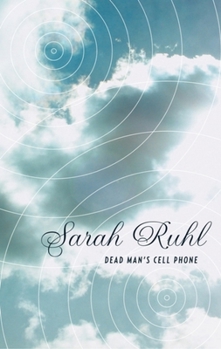Dead Man's Cell Phone (Tcg Edition)
Select Format
Select Condition 
Book Overview
"Satire is her oxygen. . . . In her new oddball comedy, Dead Man's Cell Phone, Sarah Ruhl is forever vital in her lyrical and biting takes on how we behave."--The Washington Post "Ruhl's zany probe of the razor-thin line between life and death delivers a fresh and humorous look at the times we live in."--Variety "Sarah Ruhl is deliriously imaginative and fearless in her choice of subject matter. She is an original."--Molly...
Format:Paperback
Language:English
ISBN:1559363258
ISBN13:9781559363259
Release Date:April 2008
Publisher:Theatre Communications Group
Length:96 Pages
Weight:0.40 lbs.
Dimensions:0.3" x 5.5" x 8.4"
Related Subjects
Arts, Music & Photography Death Drama Performing Arts Philosophy Social Science Social SciencesCustomer Reviews
2 ratings
IF EDWARD HOPPER HAD WRITTEN COMEDIES INSTEAD...
Published by Thriftbooks.com User , 13 years ago
In one of Edward Hopper's most famous paintings (Automat, 1927), a woman sits alone, a cup of coffee on the table in front of her. She is alone, as most of the people in Hopper paintings are, even when others share the landscape with them. (See Nighthawks [1942] and Office at Night [1940].) Dead Man's Cell Phone, by the young playwright (she was born in 1974) Sara Ruhl, conveys much the same mood as Hopper's paintings, though presented in a very different medium and a radically different style. It's a play about disconnectedness -a comedy really, because, for all the seriousness of its theme, the play is really funny. (In some ways, Ruhl is close to Arthur Adamov, the now-forgotten offspring of the absurdist era in playwriting.) The play's protagonist, meek, mousy Jean (described by another character as "a paleish woman, sort of nondescript") becomes alive handing on to people she doesn't know imaginary messages from a dead man she's never met (while he was alive, that is). The characters in Cell Phone all talk past each other, out of their own self-fantasies or from a need to connect. Each presents a different picture of Gordon, the dead man, who, it transpires, was truly awful. The effect is pointillistic. Visual images come and go behind the actors, or people swirling around them, umbrellas on high and cell phones up to their ears. Disparate meetings and the soliloquies of various players coalesce to build a mood of separateness and misunderstanding, which is played out through each character's incomprehension of the other characters' motivations and inner fiber. What is surprising, though, is the humor. In even the most savage passages (the "dead man's" monologue in Act II, for instance), how funny the lines are! A love scene in the making is disrupted by a cell phone ringing and Jean's inability not to answer it. Her wooer Dwight admonishes her: "Life is for the living," he says, but the phone rings again and Jean, of course, answers it again. "When something rings, you have to answer it, don't you?" she queries in another scene. My favorite line? It's from the dead man Gordon. "Life is essentially a giant Brillo pad," he says; our goodness is scrubbed off even as we leave the house in the morning to start the day. "I try to interpret how people subjectively experience life," Ruhl has said. "Everyone has a great, horrible opera inside him." It's also a terribly comic opera.
elegant and eloquent
Published by Thriftbooks.com User , 15 years ago
Be sure to see any production of "Dead Man's Cell Phone" in your area - it will undoubtedly be produced widely as it is elegant and eloquent. Unlike many plays, it is also a great READ. Sarah Ruhl is amazing.




